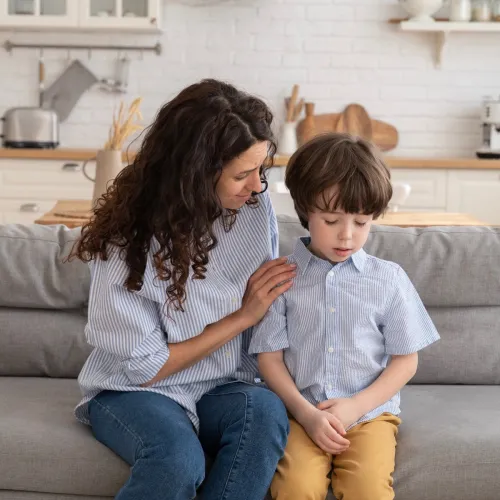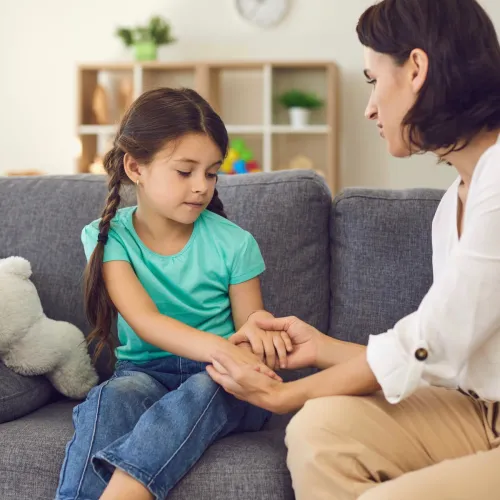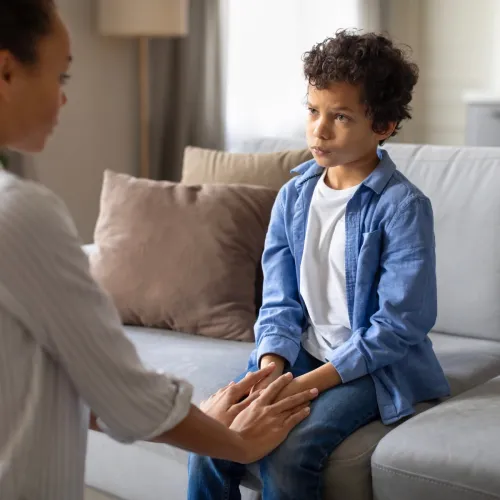How to Strengthen Self-Confidence with Self-Compassion for Children of Divorce
A common reaction of children of divorce is to put the blame on themselves for their parents’ divorce or separation. Those feelings of blame can lead to negative self-talk and affect a child’s confidence. It can result in negative thoughts, such as, “It’s all my fault, and my parents are going to stop loving me,” or “I’m going to have to choose one of my parents.”
Other common feelings children of divorce may be experiencing include sadness, anxiety, and anger. All these emotions can affect their self-confidence, especially as they are experiencing major changes in their family dynamics and routines.
Self-compassion is a skill that parents can model for their children and help their children to practice so they can strengthen their self-confidence. It is a tool that allows us to step back, acknowledge those feelings, and be gentler with ourselves.
Self-compassion, as defined by Dr. Kristen Neff (co-founder of the Center for Mindful Self-Compassion), is having compassion for yourself when you are “having a difficult time, failing, or notice something you don’t like about yourself.”
When children are self-compassionate, they are able to acknowledge their emotions and can remind themselves that they can be strong. It’s the ability to be kind to yourself and ask what you can do to help yourself, just as you would want to help a family member or friend.
Dr. Neff identified three elements of self compassion:
- Self-Kindness vs. Self-Judgement- We want our children to be gentle and understanding with themselves rather than being critical in a way that is destructive.
- Common Humanity vs. Isolation- All humans struggle with life’s difficulties and their own imperfections. Your child should feel like they’re not alone.
- Mindfulness vs. Over-Identification- If children take the time to recognize their emotions, rather than trying to suppress them, it actually helps soften those emotions.
Parents can help their children practice self-compassion by modeling positive self-talk and self-care strategies.

Positive self-talk
Parents can model being kind to themselves by saying affirming statements out loud. For example, “I know I made a mistake at work, but I know everyone makes mistakes. I am smart and I know how to learn from it.”
Parents can also guide a conversation with their children to help them acknowledge their feelings and find kind words they can say to themselves when they feel that way. They can ask, “How does a change in our routine make you feel?” The child might respond, “I feel guilty when you’re stressed about splitting time with me.” The parent can respond by saying, “My love for you is so much bigger than my stress about splitting parenting time.” That is an affirmation they can tell themselves whenever needed: “I am loved.”
You can use this positive self-talk printable to help your child develop their confidence and their resilience to cope with difficult situations. Instead of focusing on negative thoughts, the positive affirmations that replace them will remind children to be gentle with themselves. Sharing these feelings with others can help them recognize that they are not alone. Some additional activities kids can try to practice would be to write a letter to a friend who is struggling or draw a self-portrait.
Self-care strategies
In addition to using kind words to yourself, self-compassion can be modeled through self-care strategies such as meditations and exercise. Parents can discuss with their child how these activities help them to feel better. For example, a parent might say, “I am feeling overwhelmed. I am going to take ten deep breaths to help me to feel calm.”
Parents can help their child identify strategies that work for them. When they are feeling anxious, is there something they can do that is comforting to them, such as hugging a stuffed animal or coloring a picture? Children can use these strategies independently, which can be especially helpful as they adjust to new routines.
We have to remember to take care of ourselves, just as we would show compassion to others. To help your children develop self-compassion, give them the space to acknowledge their emotions and help them find strategies to be kind to themselves.




